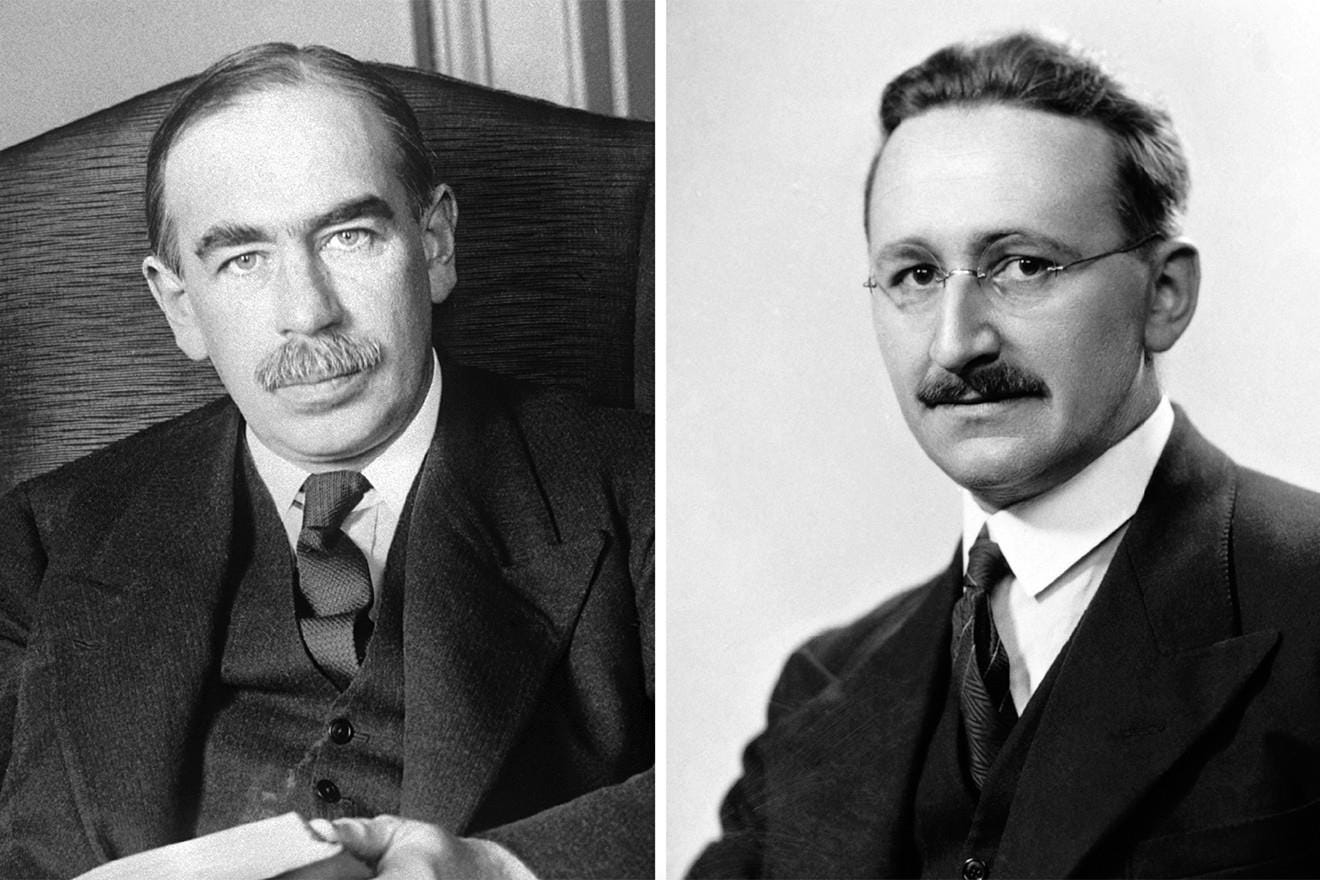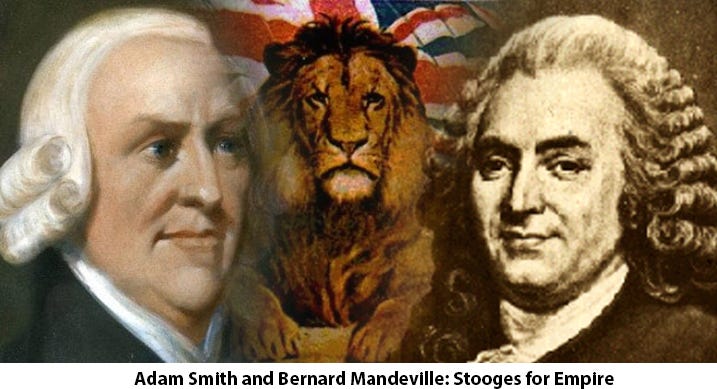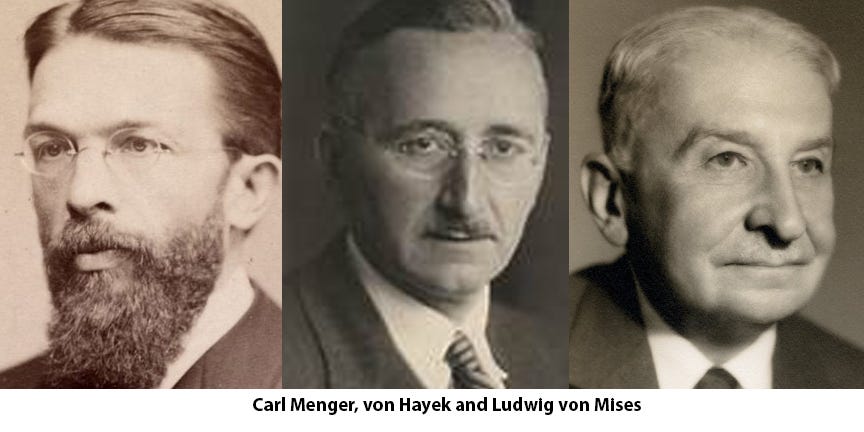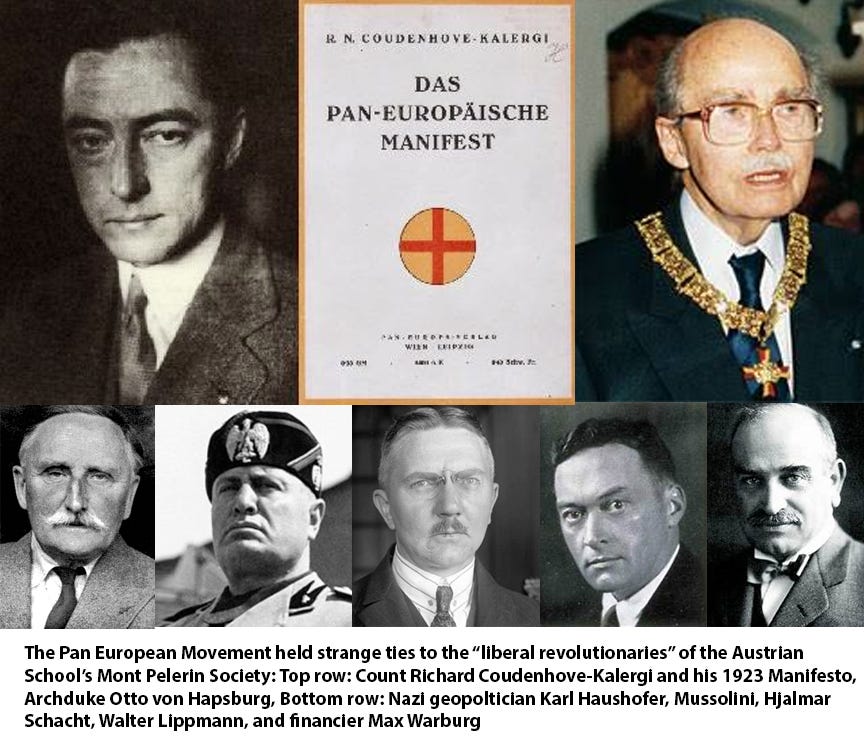Counter-gang von Hayek Revives Mandeville’s Hellfire Club in the 20th Century
Part 3 of a Trilogy
In Book 8 of The Republic, Plato’s protagonist Socrates observes astutely that “the ruin of oligarchy is the ruin of democracy. The same disease magnified and intensified by liberty overmasters democracy- the truth being that the excessive increase of anything often causes a reaction in the opposite direction and this is the case not only in the seasons and in vegetable and animal life, but above all in forms of government”.
Plato continues saying: “the excess of liberty, whether in states or individuals, seems only to pass into excess of slavery and so tyranny naturally arises out of democracy, and the most aggravated form of tyranny and slavery out of the most extreme form of liberty.”
In writing these words, Plato revealed that societies are controlled through false dualisms that cause its victims to slip from one extreme to the other in an endless cycle. This vacillation will forever occur under the condition that the people remain ignorant of certain fundamental facts of life pertaining to the co-existence of our unique freedom-loving individuality and our obligation recognize our participation within a larger social unit and higher moral law.
To the degree that this paradox is not resolved, then the individuals within society will never achieve “inner directedness” (aka: sovereignty) required to give authenticity to a nation organized by the “consent of the governed.”
The core lesson explored by Plato throughout all of his dialogues is that we are a species of BOTH reason and passion who live in a discoverable universe where both freedom and law co-exist. As Plato outlines rigorously throughout his Timaeus, this universe is shaped by a creator who made it not only Good, but also embedded his essence into the smallest particle of creation. By virtue of our ability to discover and act on this causality (aka: intention) organizing Creation, Plato demonstrates with scientific rigor that humanity truly made in the living image of that Creator, and that laws and theories must flow from that discoverable fact.
To the degree that we fail to organize ourselves in this way, society will be doomed to live under varying types of oligarchical structures, while elites (modern day sophists) manage the passions, perceptions and convictions of the masses by casting shadows upon a cave wall which we believe to be our reality.
The Story So Far
In the first installment of this 3-part series, I reviewed the false debate between top-down vs bottom-up thinking catalyzed by John Maynard Keynes vs his Austrian school enemy Friedrich von Hayek. We spent time reviewing the history of the American System of Political Economy that was advanced by Benjamin Franklin, Alexander Hamilton, John Quincy Adams, Henry Clay, Henry Carey, Lincoln, McKinley, and Franklin Roosevelt in opposition to the “British system of political economy” of free trade and speculation.
In the 2nd installment, we reviewed the sordid life and mind of a eugenics-loving imperialist name John Maynard Keynes whom generations of Americans have been told shaped the New Deal and whose ideas of “random-money-printing-during-crises” are the only solutions to stopping a meltdown like the one looming on our horizon.
In this third and final part, we will review the false “anti-Keynesian” counter-gang operation which was spread like a net to catch those unsuspecting fish who rejected the suffocating theories of Keynes and wanted something more compatible with liberty in their lives. The figure who was selected to be the champion of this counter-gang operation took the form of Austrian School economist Friedrich von Hayek.
Introducing Friedrich von Hayek
In his 1944 The Road to Serfdom, Hayek lays out his inability to resolve the “Plato paradox” early on when he discusses the problem of governments who plan for the future:
“In order to achieve their ends the planners must create power – power over men wielded by other men … Their success will depend on the extent to which they achieve such power. Democracy is an obstacle to this suppression of freedom which the centralized direction of economic activity requires. Hence arises the clash between planning and democracy”
In a nutshell, Hayek asserts that ALL forms of national planning lead inexorably to tyranny. In this, Hayek does not differentiate between George Washington, Lincoln, List or McKinley who were followers of the American System School vs fascists or radical Marxists who believed in top-down controls with no regard for individual freedom.
Hayek also argues that all progress of human history is the result of unconstrained individualism liberated from all top-down intention (“spontaneous self organization”) and that all value originates from individual passions to satisfy pleasures and avoid pain.
Neither Hayek nor his teachers Ludwig von Mises and Carl Menger created these ideas themselves, but derived all of it from the earlier works of two British Imperial strategists: 1) Adam Smith and 2) Smith’s intellectual predecessor Bernard Mandeville.
Both figures were celebrated not coincidentally by both von Hayek and John Maynard Keynes as great geniuses, and yet both were provably political agents whose ideas were in direct opposition to the American revolutionary ideals as outlined by Franklin, Hamilton, Washington et al. The patronage of both Mandeville and Smith by the highest echelons of the British Empire (Prime Ministers Walpole and Shelburne) is thus not a coincidence.
The Sick Mind of Bernard Mandeville
In 1966, Hayek delivered a lecture in praise of a figure named Bernard Mandeville (1670-1733) whose ideas, he argued, laid the foundation for British Liberalism of Adam Smith and his own Austrian school.
What did Mandeville say that was considered so innovative and wonderful? Mandeville argues that while people should try to behave ethically, the truth is that morality itself has no intrinsic existence (beyond being a useful regulator of commoners). Moreover, progress only happens when people are free to pursue their vices without limit. In his “Private Vices Public Benefits” (1714), Mandeville even argues that a killer who steals money and buys time with a prostitute, is doing a service to society since she will use that money to buy new buttons for her dress which employs a button maker, who feeds his family etc…
Mandeville defines human nature as fundamentally lustful and selfish saying: “One of the greatest reasons why so few people understand themselves, is that most writers are always teaching men what they should be, and hardly ever trouble their heads with telling them what they really are… I believe man to be a compound of various passions, that all of them, as they are provoked and come uppermost, govern him by turns whether he will or no.”
Mandeville’s famous 1905 poem The Grumbling Hive demonstrated his vile theory with a bit of creative edge:
“Vast numbers thronged the fruitful Hive;
Yet those vast Numbers made ’em thrive;
Millions endeavouring to supply
Each Other’s Lust and Vanity. …
Thus every Part was full of Vice,
Yet the whole Mass a Paradise
Flatter’d in Peace, and fear’d in Wars
They were th’ Esteem of Foreigners. …
Such were the Blessings of that State;
Their Crimes conspired to make ’em Great;
And Virtue, who from Politicks
Had learn’d a thousand Cunning Tricks,
Was, by their happy Influence,
Made Friends with Vice: And ever since
The Worst of all the Multitude
Did Something for the common Good.”
If “vice=good” then one must ask what becomes of “evil” in Mandeville’s strange world?
The answer is simple. Evil occurs when Nation states attempt to regulate or direct the economic behvior of society according to a moral principle.
As a leading figure of Britain’s Hellfire Clubs, Mandeville’s secret societies were the Epstein islands of the 18th century where all the perverse whims and passions of the oligarchy were satisfied without limit and all of the elite who wanted to take part in this early Bohemian Grove happily took part in the forbidden festivities.
Like today’s Satanists, “the Greater Good” is merely the sum total of small acts of individual evil.
Adam Smith Continues Mandeville’s Legacy
In the face of the spread of French dirigisme (protective tariffs, public credit, manufacturing and public works) during the 18th century American colonies threatening independence, another British operative was employed to generate a sanitized version of Mandeville’s system.
This new social engineer’s name was Adam Smith (1723-1790).
In his Theory of Moral Sentiments (1759), Smith asserts that economic systems should remain subject to the random animal passions of the markets. What are the guides for wealth and creativity if not goals, or intentions? Smith says it clearly: hunger, sex and the fear of pain:
“Nature has directed us to the greater part of these by original and immediate instincts. Hunger, thirst, the passion which unites the two sexes, the love of pleasure, and the dread of pain, prompt us to apply those means for their own sakes, and without any consideration of their tendency to those beneficent ends which the great Director of nature intended to produce by them.”
With his 1776 Wealth of Nations, Smith argued that no nation- especially not the new USA, should ever regulate its own economic affairs, use national banking, protect its native industries, or direct credit for internal improvements. Instead, Smith explained that nations should remain agrarian in order to maximize their profits. Every nation would do what it was good at and simply “cash crop”, but under no case develop full spectrum economies.
Like Mandeville earlier, Smith asserted that the unconstrained passions of the mob seeking to maximize their pleasure would cause progress, and invisible hands would keep this spontaneous order somehow moving forward.
While some Americans were stupid enough to drink the Kool-Aid like the democratic feudalist Thomas Jefferson, others whose minds did not turn to jelly, continued to fight to defend full spectrum economics. Throughout the 19th century these American System proponents found their champion in Henry C. Carey (1793-1879).
The American System vs British Free Trade
Carey argued that his fellow Americans must not “surrender their reason to wild, ridiculous, and absurd theories on morals, religion, politics, or science which have domineered over mankind… As a preliminary step we propose to establish the utter fallacy of some maxims, supported by the authority of the name of Adam Smith, author of the Wealth of Nations, but pregnant with certain ruin to any nation which they may be carried into operation… The influence of these maxims has been most sensibly and perniciously felt in our councils; has deeply affected our prosperity; and has been the main source whence the prevailing distress of the nation has flowed.”
Carey acted as leading Whig advisor to Presidents Harrison and Taylor alongside Henry Clay, and later became a founding member of the republican party shaping Lincoln’s economic program throughout the Civil War.
Paragons of the Dirigiste American System (left to right): Alexander Hamilton, Lincoln and Henry Carey
By 1876, Carey organized the Centennial Exhibition in Philadelphia which was a major watershed moment for the global adoption of the American System. International networks stretching from Russia, Japan, Germany, France, Italy and beyond brought leading scientists and political economists to the USA where they were exposed to the miracles of science, engineering, and industrial progress that allowed the young nation to outproduce every European state in only one century.
In Germany the American System’s greatest champion was Friedrich List (1789-1846) architect of the Zollverein and enemy of the British System. In his National System of Political Economy (1841), he wrote:
“The motto, ‘laissez faire, laissez passer’ is one that sounds no less pleasant to robbers, cheaters, and thieves than to the merchant, and therefore one ought to regard this maxim with suspicion…. This perversity, to surrender the interests of manufacturing and agriculture to the unfettered demands of trade, is a natural consequence of that theory, which universally looks only at prices, never allowing for the work required to produce, and views the entire world as one single and indivisible republic of merchants. This school of thought [Adam Smith’s] does not see that the merchant can achieve his purpose— obtaining profits by trade, even at the expense of agriculture and manufacturing, at the expense of the productive forces—just as easily through the independence and autonomy of nations. It’s all the same to him, and it is in the nature of his business and his aspirations that he cannot give a fig about the effect that the way in which he imports or exports goods might have upon the morality, the prosperity, and the power of the nation.”
Although Chancellor Otto von Bismarck (1815-1898) was ousted by a soft coup in 1890 (putting into motion Germany’s later plunge into WWI), his support for List’s reforms united Germany and catapulted it into a pre-eminent position of industrial productivity fast outpacing even the British Empire in only decades. Announcing his protective tariff policy in 1879, Bismarck stated:
“We were, up to this point, the dumping ground for the surplus production of other countries, because of our open-door policy. In my view, this wrecked the prices in Germany. It has prevented the growth of our industries and the development of our economic life. We must close this door, and erect a higher barrier. And what I now propose is that we create for German industry the same market that we up to now have benevolently allowed foreigners to exploit. If the risks of protectionism are as great as is claimed by the adherents of free trade, then France would been impoverished long ago, because they have gone with this theory since the time of Colbert.”
Similar reforms had been applied under Czars Alexander II and III in Russia under the guidance of “American System” follower Sergei Witte which drove the construction of the Trans Siberian Railway, in Japan during the Meiji Restoration, in Ireland with the Carey network that launched Sinn Fein, and in France where the American System school arose with President Sadi Carnot and Gabriel Hanoteau. These emerging new system of win-win cooperation represented a mortal threat for the decaying system of the British Empire and only a dense period of assassinations, color revolutions and war derailed that development.
The Rise of the Austrian School
It was in this climate of electric potential that Adam Smith’s system was repackaged by an Austrian intellectual named Carl Menger (1840-1921) on behalf of the Hapsburg empire which still maintained an alliance with other oligarchical families of Europe’s nobility and which desperately wanted to keep Europe de-industrial, feudal and undeveloped. Menger himself was the retainer of the Royal Houses of Hapsburg and Wittelbach acting as personal tutor to Crown Prince Rudolph von Hapsburg. Just as Smith was commissioned by Lord Shelburne to attack the French dirigiste economic school in his 18th century treatise, Menger was deployed to do the same thing in the 19th century.
After the fires of WWI had settled, the “peace” became little more than an interlude in preparation of a new form of world order to be run by fascist strong men. Though it is often overlooked today, “corporatist fascist economics” did not make its first appearance in Italy as is commonly believed, but rather in Austria after the dissolution of the Austro-Hungarian empire in 1919.
At this time, von Hayek worked as the aid to Ludwig von Mises who then served as chief economic advisor to Austria’s new government, under the direct control of the Bank of England’s new governor Montagu Norman and the League of Nations’ Arthur Salter (head of the League’s Supreme Economic Council). Under Mises’ direction, the post-war Austrian government-imposed cuts to services, government spending, and wages leading to mass starvation and poverty. These acts would serve as a template for what Italians and Germans would soon face.
Although Libertarians assert that this austerity was necessary to stop hyperinflation, the great German Foreign Minister Walter Rathenau (follower of Friedrich List and the American System) had a very different idea when he organized the Rapallo Treaty with Russia and dirigiste revival (which were only sabotaged with his June 1922 assassination).
At the height of Weimar’s 1923 Hyperinflation, an organization formed called Pan European Movement led by Count Richard Coudenhove-Kalergi, and Archduke Otto von Hapsburg. This organization was funded by Louis de Rothschild, and Max Warburg while its members included Mussolini, Walter Lipmann, and Nazi Finance Minister Hjalmar Schacht. The PEM would aim to replace nation states with a “benign feudalist system” that became the guiding template for the later European Union years later. Von Hapsburg’s dual role as leader of both this organization and several Austrian School think tanks is not a coincidence.
The Mont Pelerin Society: Fascism with a Liberal Face
Before creating the Mont Pelerin Society in 1947, Hayek had earlier founded the Society for Renovation of Liberalism (SRL) in 1939. Nearly all of the founding members of this group were found among the 37 original Mont Pelerin members. Among this Fabian Society-dominated group were Milton Friedman’s teachers Frank Knight and Henry Simons, Fabian Society member Walter Lipmann, George Soros’ mentor Karl Popper, Ludwig von Mises, and Sir John Clapham. George Soros’ Institute for New Economic Thinking is an extremely lame continuation of this tradition.
With the untimely death of the Franklin Roosevelt, who had threatened to create U.S.-Russia-China post-war alliance the way Henry Carey had nearly done earlier, Keynes’ system of fascist controls were infused into the governance of the Bretton Woods institutions as FDR’s anti-colonial dream was killed.
While Keynes’s doctrine of top-down controls, the Mont Pelerin Society created a counter pole of “bottom up” free markets. It is noteworthy that this group was also run by Pan Europeanists Otto von Hapsburg and Max von Thurn und Taxis (heir to the powerful Venetian family that migrated to Germany in the 15th century). One of Otto von Hapsburg’s last projects before his 2011 death was the creation of the Dignitatis Humanae Institute, now led by neo-fascist Steve Bannon with the mandate of “uniting the right-wing movements of the world” under an anti-Chinese, anti-Muslim perspective.
Although it took nearly 30 years (and several dozen coups and assassinations of nationalist leaders from 1946-1971), the industrial growth of the Bretton Woods system was ultimately killed when the U.S. dollar was floated onto the speculative markets.
After patiently waiting for decades, their time had finally come.
The hundreds of international Austrian School think tanks spread across the Trans Atlantic went speedily to work applying the “solution” to the problems created by the central planning of Keynesianism. Under this “remedy”, a new age of de-regulation, privatization, and “monetarism” was unleashed under a new “greed=good” ethos that would have made Mandeville and Adam Smith smile proudly.
To give an air of legitimacy to this economic paradigm shift, Hayek and Milton Friedman were awarded Nobel Prizes, and theirs quickly became the “new gospel” that infused itself into the conservative right of the world as the “conservative revolution” was launched.
Hayek’s Supranational Police Force and Population Control
It is here that the image of the “lover of freedom” disintegrates and the actual cold fascist soul of Hayek will show its ugly head.
Even though he is sold as an anti-Malthusian (promoting the idea that totally free markets will magically create the creative changes needed to overcome our carrying capacity), Hayek put his views on record saying in 1981:
“Over the next 20 years, the world population is expected to double again. For a world that is founded on egalitarian ideas, the problem of overpopulation is unsolvable. If we guarantee that everyone who is born will be supported, we will soon no longer be able to fulfill that promise [since growth will outstrip resources- ed]. There is only one break for overpopulation, namely that the only ones who may survive and procreate are those who can support themselves.”
The question now arises: who does Hayek believe should grant permission for those self-supporting alphas to procreate and revoke the right to procreate of those who cannot support themselves? He answers this question in the last chapter of his 1944 Road to Serfdom:
“There must be a power which can restrain the different nations from action harmful to their neighbors, a set of rules which defines what a state may do, and an authority capable of enforcing these rules. The powers which such an authority would need are mainly of a negative kind: it must, above all, be able to say “No” to all sorts of restrictive measures.” [p.232]
Hayek goes onto state: “The need is for an international political authority which, without power to direct the different people what they must do, must be able to restrain them from action which will damage others…. An international authority which effectively limits the powers of the state over the individual will be one of the best safeguards for peace.”
It is interesting how a radical individualist incapable of resolving Plato’s “Duty/Freedom” paradox so quickly concludes that for world peace to exist, a global international police force must be created to control nations and judge who may or may not procreate in order to stop overpopulation (or any action which social engineers judge to be harmful to society for that matter).
The Morals of This Story
John Maynard Keynes was not the architect of the New Deal or even Bretton Woods, although he did want world government and population control from the top.
Friedrich von Hayek was never the defender of true freedom from tyranny but just another peon for empire who created a “false opposition” to Keynes and still promoted a supranational leviathan run by experts from the top.
Both operatives were steered from British Intelligence (aka: the new priests of Apollo at Delphi) which wanted you to fall into a false left vs right, top-down vs bottom-up, mind vs emotion debate which has confused humankind for millennia.
Both Hayek and Keynes repackaged the core anti-humanist axioms of Bernard Mandeville, Thomas Malthus and Charles Darwin into their systems and both obscured the true existence of the American System of Political Economy.
To the degree that we fail to understand what Plato was actually doing as a cultural warrior seeking to outflank the imperial cults of Persia then operating through the Temple of Apollo at Delphi during his life and exhibited throughout his dialogues, we will never come to know what Benjamin Franklin understood as he prepared the groundwork for the world’s first Democratic Republic in 1776.
Franklin knew that this would be neither a monarchy nor a mob democracy.
These founding fathers had, after all, studied Plato and strove to finally resolve the “freedom vs duty” paradox by forming a government based simultaneously on the sacredness of the individual as outlined in the Declaration of Independence and the General Welfare of the whole as outlined in the Constitution.
Whether this American experiment will prove to have been a failure or a success will depend on the morality, courage and honesty of citizens both in America itself and globally to confront the lies of the past and the needs of the future as we move into a new phase of civilization.
Matthew Ehret is the Editor-in-Chief of the Canadian Patriot Review , Senior Fellow at the American University in Moscow, BRI Expert on Tactical talk, and has authored 3 volumes of ‘Untold History of Canada’ book series. In 2019 he co-founded the Montreal-based Rising Tide Foundation. He can be reached at matt.ehret@tutamail.com









